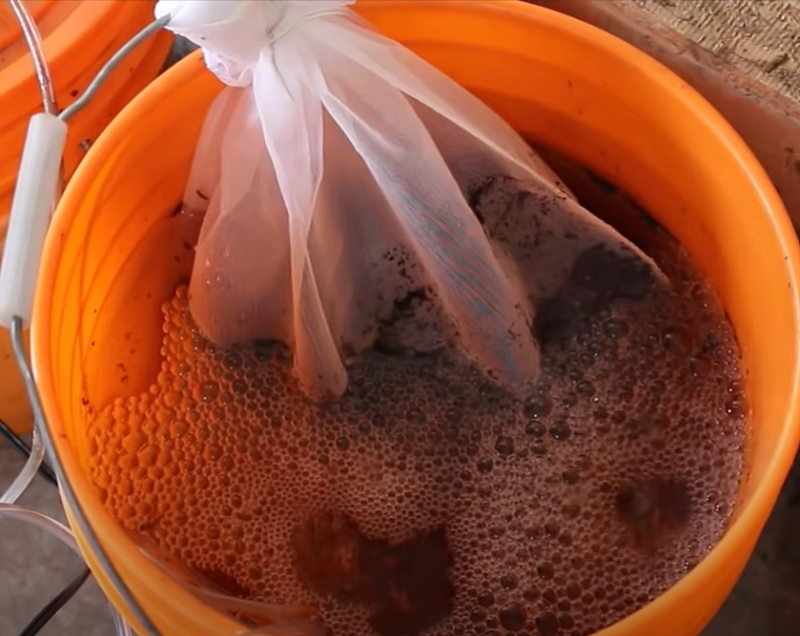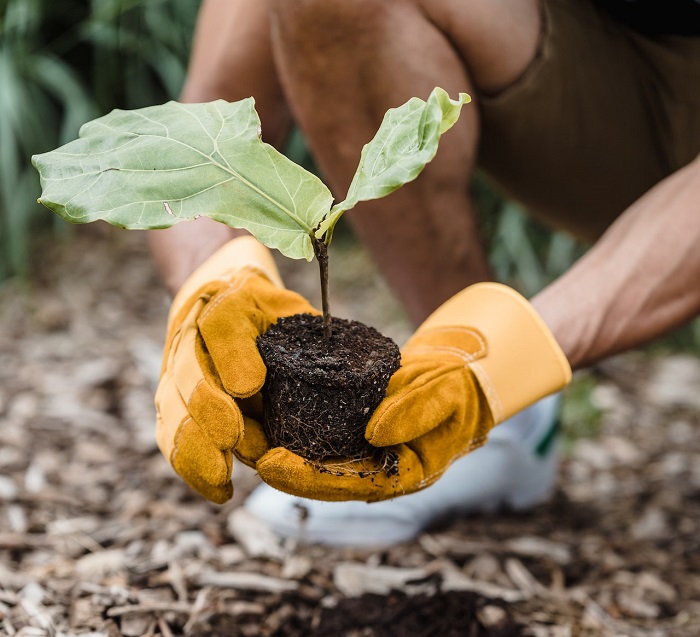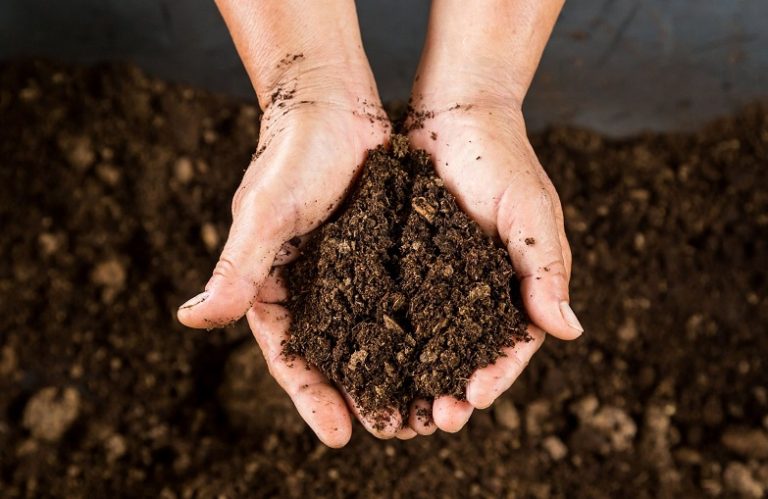Compost Tea: The Ultimate Soil Boosting Solution
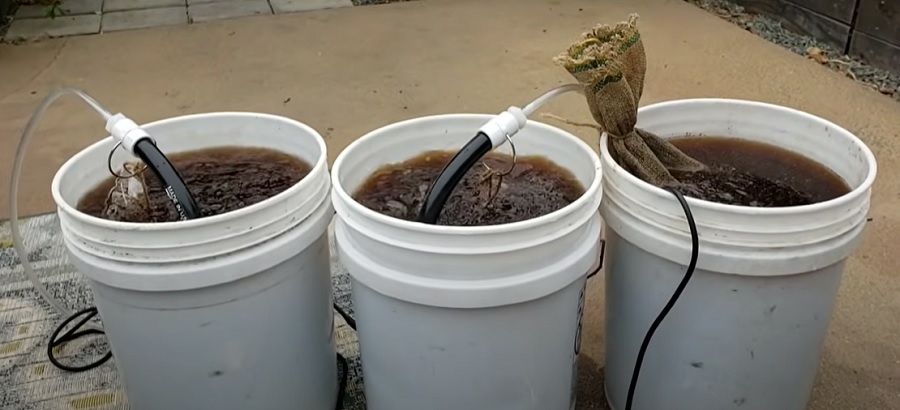
If you haven’t been using compost tea in your garden then get ready to supercharge your plants.
You should know that brewing compost tea requires a bit of hard work, dedication, and patience to ensure you will extract all the beneficial microorganisms.
To grow anything in an eco-friendly way and not use chemical fertilizers is one of the most important aspects in the quality of your garden soil.
I’m sure you already realize that healthy soil directly affects how well your plants will grow.
The goal here is to improve soil quality it can seem like a complex process, but with a quality compost mixture, it can be made safely and easily with a great compost tea.
After making my first batch I can share with you the very best method to make compost tea and ensure happy gardening results.
I will explain its benefits, and provide you with a step-by-step guide to help maximize your results.
What is Compost Tea?
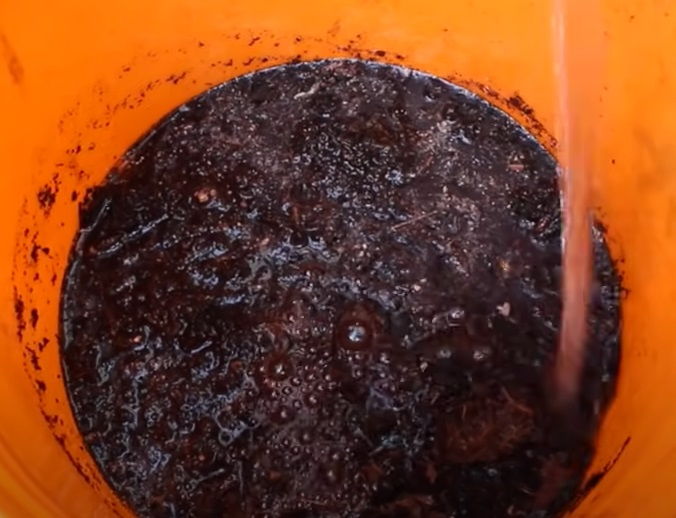
Compost tea is an organic, liquid fertilizer made from solid compost material. The liquid contains the same plant nutrients from the compost with a complex combination of living microorganisms that are beneficial for plant growth.
They improve soil structure, make nutrients more available to plants, and suppress soil-borne diseases.
Two types are aerated and non-aerated compost tea
Aerated compost teas
involve actively aerating the liquid with a blower, bubbler, or similar device.
These teas involve actively aerating a mixture of compost, water, and other additives to create a liquid that is rich in beneficial microorganisms.
The aeration process helps to increase the number and diversity of these microorganisms, which can help to improve soil structure and nutrient availability.
Gardeners and farmers can apply the compost tea to their plants and soil, either as a foliar spray or a soil drench, to promote plant growth, resist disease, and stimulate biological activity in the soil.
While making compost tea may require some effort, the benefits it can provide make it a valuable addition to any gardening or farming practice.
Non-aerated compost tea
This liquid fertilizer is made by steeping compost in water and allowing beneficial microorganisms to multiply and thrive.
While many varieties of compost tea require aeration to promote microbial growth, non-aerated versions are also an option.
However, it’s important to note that these non-aerated teas may need to be stirred or mixed occasionally to ensure that solid materials don’t settle to the bottom and reduce effectiveness.
Regardless of the method used, compost tea can be a fantastic addition to any garden or yard, providing valuable nutrients and supporting healthy plant growth.
Making a Non-aerated compost tea recipe
Making compost tea is straightforward, and the good news is that you don’t need any fancy equipment.
Here’s a step-by-step guide to making compost tea:
Step 1: Fill a 5-gallon bucket with water.
Step 2: Add one shovel of compost for every gallon of water.
Step 3: Stir the compost using a stick to mix it with the water. Keep stirring until the compost is evenly distributed throughout the water.
Step 4: Leave the mixture to steep for 24-48 hours. During this period, oxygenate the water with an air pump to facilitate the growth of beneficial microbes.
Step 5: After 24-48 hours, strain the finished compost tea out through a strainer to remove any remaining compost.
Step 6: Use a watering can or sprayer to apply the compost tea to your plants’ soil.
Making an aerated compost tea recipe
This easy-to-make recipe involves soaking organic compost in water, oxygenating the mixture with an air pump, and letting it steep for several hours.
The resulting tea is rich in beneficial microorganisms that can help improve soil health and support plant growth.
Step 1: Fill a 5-gallon bucket with water and let it sit for 24 hours to allow the chlorine to evaporate.
Step 2: Add 3 cups of compost to the bucket and stir it until it is evenly mixed with the water.
Step 3: Place an air stone in the bucket and connect it to an air pump.
Step 4: Turn on the air pump and allow it to run for 24 hours.
Step 5: After 24 hours, turn off the air pump and remove the air stone from the bucket.
Step 6: Cover the bucket with a lid or cloth and let it sit for 48 hours.
Step 7: After 48 hours, strain the tea through a cheesecloth or coffee filter into another container.
Step 8: Discard the solids that are left behind.
Step 9: Pour the tea into a spray bottle and apply it to your plants’ leaves, being careful not to saturate them.
Step 10: Repeat this process every 2-3 weeks during the growing season.
Benefits of Compost Tea
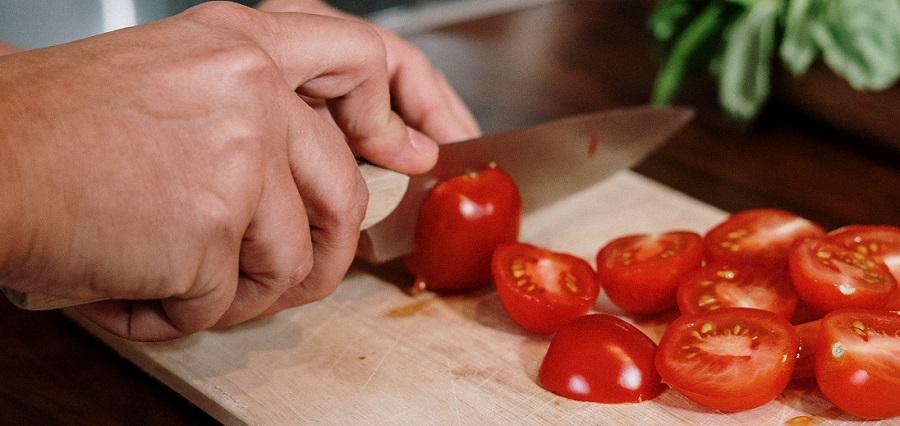
Compost tea has numerous benefits, one of which is enhancing soil fertility.
When added to soil, compost tea can correct deficiencies in vital nutrients such as nitrogen and phosphorus, making them more available to your plants.
Additionally, the tea’s beneficial bacteria and fungi help to enhance plant growth and prevent soil-borne diseases.
Compost tea is also an excellent soil conditioner. It improves the structure of the soil, making it more porous, allowing water, and air to penetrate the soil more easily.
What are the disadvantages of compost tea?
Compost tea can be a beneficial organic fertilizer for plants, but it also has some potential disadvantages.
Here are a few:
Risk of Pathogens:
Compost teas made from improperly composted materials or contaminated water sources can carry harmful pathogens that could harm plants and potentially even humans.
Overuse:
Too much of a good thing can be bad!
Excessive use of compost tea can lead to nutrient imbalances and toxicity in plants, which can damage or kill them.
Storage and Application:
Compost tea must be stored and applied correctly to maximize its benefits.
Improper storage can lead to the growth of harmful bacteria, while incorrect application can cause nutrient deficiencies or excesses in plants.
However, after brewing your compost tea, it’s important to store it properly to maintain its effectiveness.
The first step to storing your tea is to transfer it into an airtight container, such as a glass or plastic jar.
An opaque container is ideal, as it reduces UV exposure which can decrease the tea’s potency.
Next, it’s recommended to keep the tea refrigerated to prevent any bacterial growth or fermentation.
Be sure to label the container with the date of when the tea was brewed, and use it within 7-10 days for optimal results.
By following these simple steps, you can ensure that your compost tea remains fresh and potent for your plants to enjoy.
Environmental Concerns:
The production of compost tea requires water, energy, and resources, which could have an impact on the environment if not managed responsibly.
It is important to use compost tea safely and responsibly to maximize its benefits and minimize any potential risks or disadvantages.
But is compost tea safe?

I’ve been told many times that making compost tea could harbor dangerous bacteria like salmonella or e.Coli.
So I help avoid this by only using finished compost, not always raw manure. Personally, I do use finished compost from my healthy, grass-fed animals, but the choice is yours.
At the end of the day, making a compost tea mixture is a great way to improve your garden soil and promote healthy, vibrant plants.
I always try to keep it simple but you can get creative with your own unique recipe.
I’ve read that some people add, a combination of stinging nettle, comfrey and burdock to their mixture.
Just follow these guidelines for the best results, and enjoy the benefits of compost tea in no time.

